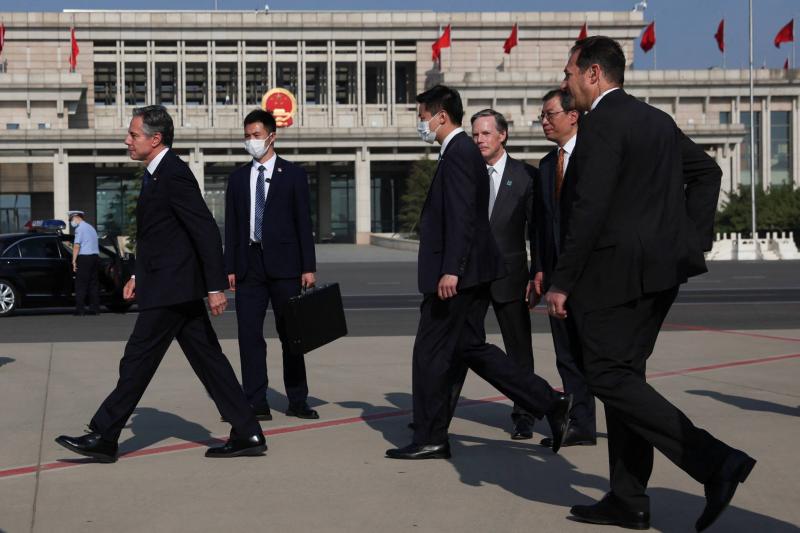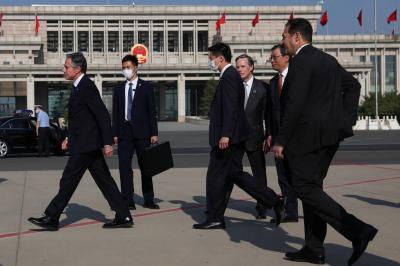U.S. Secretary of State Antony Blinken began meetings in Beijing today, Sunday, on a two-day visit, the first by a U.S. Secretary of State in five years, amid cool bilateral relations and slim hopes for a breakthrough regarding a long list of disputes between the world's two largest economies. After the visit was postponed in February due to the suspected flight of a Chinese spy balloon over U.S. airspace, Blinken became the highest-ranking U.S. government official to visit China since President Joe Biden took office in January 2021.
Chinese Foreign Minister Qin Gang welcomed Blinken and his accompanying delegation at the entrance of the Diaoyutai State Guesthouse in Beijing, where both had a brief conversation in English before shaking hands in front of both the Chinese and U.S. flags. After heading to the meeting room, neither Blinken nor Qin made statements to reporters who were allowed in for a short period. The U.S. State Department indicated that Blinken held "frank, substantive, and constructive" talks with his Chinese counterpart Qin Gang.
U.S. State Department spokesman Matthew Miller stated, "The Secretary emphasized the importance of diplomacy and maintaining open channels of communication regarding a number of issues to reduce the risks of misunderstanding and miscalculation," adding that Blinken invited Qin to visit Washington to continue the discussions. Similarly, Chinese Assistant Foreign Minister Hua Chunying, who attended the meeting, wrote on her official Twitter account, "I hope this meeting can help steer China-U.S. relations back to what the two Presidents agreed upon in Bali."
Chinese state media reported that Foreign Minister Qin Gang told Blinken that China is committed to building a "stable and constructive" relationship with the United States. It also indicated that Qin expressed China's concerns about its core interests, particularly the issue of Taiwan, describing it as the "most prominent danger" to China-U.S. relations.
During his visit, which concludes tomorrow, Monday, Blinken is expected to also meet with senior Chinese diplomat Wang Yi, and possibly President Xi Jinping, in an attempt to create open and permanent communication channels to ensure that the strategic rivalry between the two countries does not escalate into conflict. There are expectations that Blinken's visit could pave the way for more meetings between the two countries in the coming months, including possible visits by Treasury Secretary Janet Yellen and Commerce Secretary Gina Raimondo. It could also lead to meetings between Xi and Biden at multilateral summits later this year.
Biden expressed on Saturday that he "hopes to meet President Xi in the coming months." The leaders' meeting in Bali, Indonesia, last November briefly eased concerns about the possibility of a new Cold War; however, high-level communication has become rare following the suspected Chinese spy balloon's incursion over the United States.
The world is closely watching Blinken's visit, as any escalation between the two powers could have global repercussions affecting everything from financial markets to trade routes and global supply chains. A senior U.S. State Department official stated to reporters during a fuel stop in Tokyo before heading to Beijing, "There is recognition on both sides that we need high-level communication channels."
Relations between the two countries have deteriorated in various areas, raising fears of a potential military confrontation one day, due to Taiwan, which China claims as its territory. They also disagree on issues including trade, efforts by the U.S. to curb China's semiconductor industry, and Beijing's human rights record. Particularly concerning for China's neighbors is its reluctance to engage in regular talks between its military and the U.S. military, despite Washington's repeated attempts in this regard.
At a press conference on Friday before his departure to Beijing, Blinken stated that the trip has three main objectives: to establish mechanisms for crisis management, to promote the interests of the United States and its allies, and to speak directly about related concerns, and to explore potential areas of cooperation. Blinken added that he would also raise the issue of American citizens detained in China on charges that Washington claims are politically motivated.
An American official indicated that among the issues to be discussed is the possibility of increasing commercial flights between the two countries, describing it as a step that could help enhance relations between the two peoples, although the official did not anticipate any progress. U.S. officials, who reviewed the visit's agenda in a phone briefing days before, downplayed expectations for significant progress. While Blinken's primary goal would be to conduct "frank, direct, and constructive" discussions, officials indicated that a breakthrough on any key issues was unlikely.




